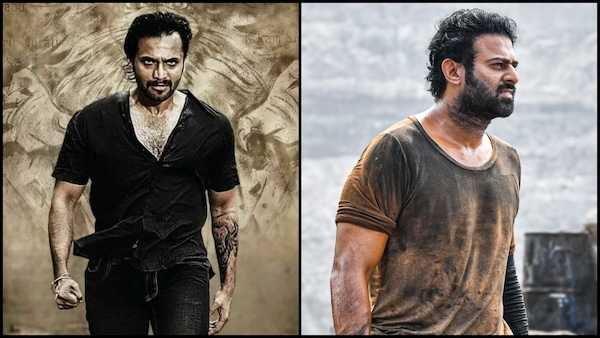Salaar Part 1 Ceasefire - Is Prashanth Neel, Prabhas' film a full-blown remake of 'Ugramm'? Let's find out...
Prashanth Neel himself has divulged that 'Salaar: Part 1 - Ceasefire' is "drawn" from the 2014 film 'Ugramm'. This article explores the line dividing a remake and a retelling of the same story.

Last Updated: 11.26 AM, Dec 22, 2023
Minor Spoilers Ahead...
Prashanth Neel recently confirmed with great candor that his latest film Salaar: Part 1 - Ceasefire is indeed derived from his own 2014 film 'Ugramm', which marked his directorial debut. However, he added an important footnote that the new film isn't a remake but a retelling of the story, with the scale evidently shot up multifold.
He has, of course, the luxury of a much bigger budget after having a mammoth success in the two KGF films (KGF: Chapter 2, in particular, which has grossed more than Rs. 1250 crores worldwide). More importantly, Neel comes across as a more confident and "seasoned" filmmaker who knows how to lend 'Salaar' the stature it requires, given what's at stake.
But first, let's address the heart of the matter - Is 'Salaar' a remake of 'Ugramm'? In the conventional sense, the answer is a (tentative) YES. Those who have watched the Kannada film will spot the glaring similarities at first glance and are likely to find a good chunk of the plot points familiar. The ethos of 'Ugramm' is apparent in several places and so is the structure to a large extent, although Prashanth Neel makes subtle changes that prove to be quite tactical.
That said, would you walk out of the cinema hall feeling that you have watched the 2014 film all over again? The answer here, fortunately, is a NO. One would find Prashanth Neel's approach this time around to be starkly more ambitious and measured, mainly because, again, he seems quite competent in using each of his resources to its fullest potential. The said essence of the previous attempt is felt in a prominent way, no doubt, but Neel uses it only to subvert our expectations. At best, 'Ugramm' can be seen as the necessary platform for him to mount a much larger, convoluted world that has enough depth and surprises held within.
Here are three important distinctions that are to be addressed to put the 'Ugramm remake' discourse in perspective:
- Mughor vs Khansaar
"I don't really like to shoot in 'real' worlds," confesses Prasanth Neel in a recent interview, highlighting the fact that he finds tremendous joy in painstakingly conceiving and creating a new and fictional world. There was Mughor in Ugramm, Narachi in the KGF movies and Khansaar now, in 'Salaar', and it would be safe to that he has grown as a filmmaker in that particular aspect with each passing film. That trajectory alone establishes the main difference between the two films in question.
Thereby, in a manner to speak, if Mughor is an entity that is a lot closer to reality, Khansaar is its heavily mythologised version. The latter is also a lot more vivid and layered and where Prashanth Neel shines the brightest as the writer in 'Salaar' is when he uses the many workings of Khansaar to take the narrative forward and not simply build a facade.
There are similarities as well because both worlds are epicentres of crime, power and greed but while Ugramm introduced us to Mughor in broad strokes, 'Salaar' is predominantly centred around Khansaar. You will find an array of tribes, clans, the high chair, the king, the heirs, step-siblings battling over the throne, the many chieftains who are eyeing the same spot and so much more, that a two-part film seems warranted to explore it all.
Khansaar, in itself, is a derived world that has echoes of works like the Mahabharata, the blockbuster TV series Game of Thrones and many other sources, but Neel is smart enough to employ all his inspirations in the right manner.
- The Central Conflict
Another important distinction in this juxtaposition is how the main conflict plays out. At the outset, both 'Ugramm' and 'Salaar' are about two fierce friends turning foes but with the latter, Prashanth Neel seems at a lot more leisure to explore this interesting shift in dynamics. Unlike 'Ugramm', the story doesn't kick off with a "guide", as it were, to ease us into the plot and to make things more exciting, he chooses to enhance the mystery this time around.
We know well in advance that Deva and Varadha will clash at one point but he takes the simplistic angle in 'Ugramm' and elevates it quite grandly, leaving us hooked to every little element of that relationship. Again, the world Neel builds is crucial to how everything unfolds because he does the job in a gradual manner and dials up the tension one beat at a time. His nonlinear screenplay is also effective in making things entertaining and engaging, even though we know that there's a big action sequence around every corner.
- The Characters
The task of creating an expansive world also carries the necessity of etching out compelling characters. And Prashanth Neel does a good job at it, lending enough girth to all the many "players" of Khansaar and making them memorable through certain quirks that aren't taken overboard.
In the same vein, the lot that one saw in 'Ugramm' has been dealt with more flair and this is another instance of Prashanth Neel making significant strides as a writer-director. The counterpart of Easwari Rao's character, for instance, was rendered archetypal previously but this time around, you see that she is of a lot more significance to the story and is her own individual in the large scheme of things.

On the other hand, Shruti Haasan's character isn't as prominent as Hariprriya's in 'Ugramm', mainly because Neel decides to do away with the love story so as to focus on the bigger aspects.
The barrage of characters, names, their respective triggers and motives is a lot to comprehend but Prashanth Neel is well aware of the fact that he has another entire film at his disposal to tie off the loose ends. And even if he doesn't, there's enough on his plate already to reckon with and at this point, the Deva and Varadha equation is all that needs his attention.

